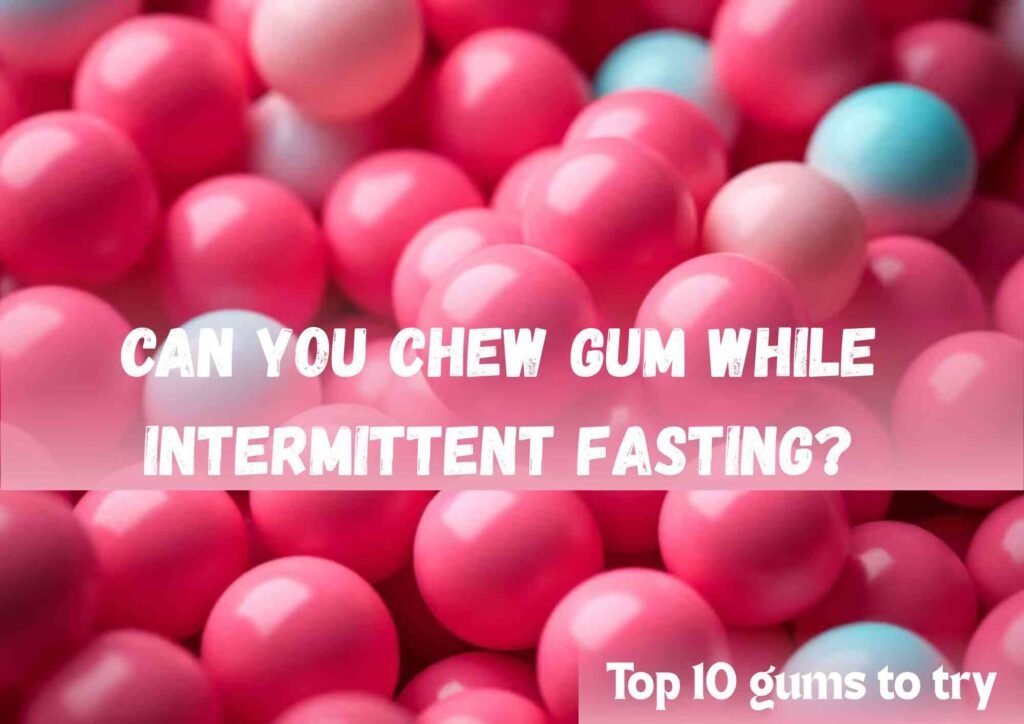Introduction
For those practicing intermittent fasting or about to begin, maintaining the fasted state is crucial for achieving optimal results. A common question arises: Can you chew gum while intermittent fasting? The answer isn’t straightforward, as it depends on several factors, including the type of gum, your fasting goals, and how your body responds to artificial sweeteners. Whether you have a black coffee or herbal tea, the sugar craving haunts your brain, and sometimes it can put an end to the benefits of intermittent fasting. So, what can be done?

Let’s get to know more in detail:
✔ Does the act of chewing trigger digestion?
✔ Do artificial sweeteners spike insulin?
✔ Will sugar-free gum ruin your fat loss progress?
Stick to this blog to explore the scientific studies, expert opinions, and real-world experiences to give you a clear answer. Here’s what you need to know.
To understand Intermittent fasting and to get a clear picture of what type of fasting suits you, you can read this article – Intermittent fasting – Best Guide to a Healthier Life.
Can You Chew Gum While Intermittent Fasting
1. The Calorie Question: Does Gum Contain Enough to Matter?
Sugar-free gum typically contains less than 5 calories per stick; many brands even list it as “zero calories.” While it’s not actually zero, this small amount of caloric intake is generally considered to have a minimal impact on your fasted state.
On the other hand, regular gum, aka the sugary kind, can contain 10+ calories and grams of sugar, enough to nudge you out of your fasting state by triggering an insulin response. This is especially crucial if your fast is for religious purposes or strict fat loss.
Expert opinions: Most health professionals agree that consuming under 50 calories (especially from sugar-free sweeteners) will not drastically affect the health benefits of fasting for most people.
2. The Insulin Problem: Do Sweeteners Trigger a Response?
Here’s where it gets a bit nuanced. Many types of gum use artificial sweeteners or sugar alcohols like xylitol or sorbitol, and their effects can vary:
Artificial sweeteners (like aspartame or sucralose): Some scientific studies suggest they might cause a slight insulin response, although this isn’t consistent across the board. A 2018 study in Nutrients showed non-nutritive sweeteners had a minimal impact on blood sugar levels for most healthy individuals.
Sugar alcohols: These are naturally derived but can cause digestive discomfort in large quantities. However, options like xylitol not only spare your blood sugar levels but may also support dental health.

Everyone’s response differs, monitor how your body reacts, especially if you’re chasing weight loss goals or improving insulin sensitivity.
3. The Chewing Effect: Does It Stimulate Hunger?
Here’s an overlooked but interesting aspect—the act of chewing itself:
Pros:
Chewing can reduce hunger pangs by tricking the brain into thinking food is coming. This effectively helps you to reduce your food intake.
It increases saliva production, which supports oral hygiene and protects against tooth decay and bad breath.
It may even stimulate blood flow and brain function.
Cons:
For some people, the sweet taste of even sugarless gum can trigger sugar cravings, making the fasting window feel longer and more difficult.
It may prime your digestive system to expect food, potentially dulling some of the metabolic health perks of fasting.
It’s a bit of a gray area, and it depends on your specific goal, whether it’s fat loss, religious fasting, or simply extending your fasting schedule for improved metabolic state.
Best and Worst Gum for Intermittent Fasting (with lists)
Best Gum Options During Fasting
For those who want to have a stick of sugar-free gum while fasting, these options are least likely to disrupt your fast:
Xylitol-sweetened gum: Xylitol has a minimal effect on blood sugar levels and offers dental health benefits. Research indicates that it doesn’t significantly impact insulin levels in most individuals.
Stevia-sweetened gum: As a natural sweetener, stevia doesn’t raise blood sugar and has zero calories, making it a good option for fasting periods.
Gum with gum base only: Some specialty gums contain no sweeteners at all, eliminating any concerns about insulin response.
Here are 10 popular sugar-free gums suitable for intermittent fasting:
| Brand | Sweeteners Used | Calories (per piece) | Artificial Sweeteners | Key Features | Fasting-Friendly Notes |
| PUR Gum | Xylitol (non-GMO) | ~2 | ❌ | Aspartame-free, vegan, gluten-free, natural flavors | ✔ Great for clean fasting; no artificial ingredients |
| XyliChew | Birch Xylitol | ~2 | ❌ | Gentle on the stomach, gluten-free, no artificial flavors | ✔ Teeth-friendly and easy on digestion |
| Epic Dental Gum | Xylitol (45%) | ~2 | ❌ | Dentist-recommended, high xylitol content | ✔ Supports oral health, especially during fasting |
| Spry Gum | Xylitol (non-GMO) | ~1-2 | ❌ | Natural flavors, smooth chew, dental care focused | ✔ Clean ingredients, good for extended fasts |
| Simply Gum (Sugar-Free) | Xylitol, Stevia | ~2-3 | ❌ | Organic, minimal ingredients, biodegradable packaging | ✔ Ideal for clean eating and fasting |
| B-Fresh Gum | Xylitol, Calcium | ~2 | ❌ | Balances oral pH, gluten-free, no GMOs | ✔ Great if you want dental benefits during fasting |
| Zellie’s Dental Gum | 100% Xylitol | ~2 | ❌ | Created by dentists, promotes oral hygiene | ✔ Trusted brand for fasting periods |
| Glee Gum (Sugar-Free) | Xylitol (chicle base) | ~2 | ❌ | Natural gum base (tree sap), no aspartame | ✔ For those who prefer plastic-free gum |
| Xyloburst Gum | Xylitol | ~2 | ❌ | Strong mint flavors, sugar-free, and dental health support | ✔ Popular among clean fasters |
| Orbit Sugar-Free Gum | Sorbitol, Aspartame, Acesulfame K | 0 | ✅ | Affordable, accessible, and comes in many flavors | Artificial sweeteners may not suit clean fasts |
Best for Clean Fasting: PUR, XyliChew, Spry, Simply Gum, Zellie’s
Best Dental Support: Epic Dental, Spry, Zellie’s, B-Fresh
Avoid if Sensitive to Artificial Sweeteners: Orbit, Extra
Extra sugar-free gums
| Gum Variety | Serving Size | Calories | Total Carbohydrates | Sugar Alcohols | Sweeteners | Notes |
| Extra Peppermint | 1 stick (2.7g) | 5 | 2g | 2g | Sorbitol, Aspartame, Acesulfame K, Mannitol | Zero sugar; contains artificial sweeteners. |
| Extra Spearmint | 1 stick (2.7g) | 5 | 2g | 2g | Sorbitol, Aspartame, Acesulfame K, Mannitol | Zero sugar; contains artificial sweeteners. |
| Extra Winterfresh | 1 stick (2.5g) | 5 | 2g | 2g | Sorbitol, Aspartame, Acesulfame K, Mannitol | Zero sugar; contains artificial sweeteners. |
| Extra Polar Ice | 1 stick (2.5g) | 5 | 2g | 2g | Sorbitol, Aspartame, Acesulfame K, Mannitol | Zero sugar; contains artificial sweeteners. |
| Extra Sweet Watermelon | 1 stick (3g) | 5 | 2g | 2g | Sorbitol, Aspartame, Acesulfame K, Mannitol | Zero sugar; contains artificial sweeteners. |
Key Points:
Sugar Content: All listed gums are sugar-free, making them suitable for intermittent fasting.
Sweeteners: These gums use artificial sweeteners like Aspartame and Acesulfame K. While they don’t contain sugar, some individuals may prefer to avoid artificial sweeteners during fasting.
Caloric Impact: Each piece contains approximately 5 calories, primarily from sugar alcohols like Sorbitol and Mannitol. These have minimal impact on blood sugar levels but can cause digestive discomfort in some individuals if consumed in excess. Land M Supply+2
Gums to Avoid While Fasting
Certain types of gum are more likely to interfere with your fasting goals:
Sugar-sweetened gum: The obvious culprit, containing actual sugar that will spike blood glucose and insulin levels.
Gum with maltitol: This sugar alcohol has a higher glycemic index than some other sweeteners and may cause digestive discomfort in large quantities.
Gums with multiple sweeteners: Some combine artificial sweeteners with more sugar content, which might trigger stronger insulin responses or cravings.

Here is the list of gums to be avoided.
1. Orbit Sugar-Free Gum
- Why to Avoid: Contains aspartame and acesulfame K, both artificial sweeteners that may trigger insulin response or cravings in some people.
2. Extra Sugar-Free Gum
- Why to Avoid: Sweetened with sorbitol, mannitol, and aspartame—all artificial and may interfere with clean fasting or gut health.
3. 5 Gum
- Why to Avoid: Uses sucralose and acesulfame potassium—artificial sweeteners linked to changes in gut microbiome and insulin sensitivity.
4. Trident Sugar-Free Gum
- Why to Avoid: Although it contains xylitol, it’s also sweetened with sorbitol and aspartame, making it not ideal for clean fasts.
5. Eclipse Sugar-Free Gum
- Why to Avoid: Contains artificial flavors, aspartame, and BHT (a preservative that some people choose to avoid for health reasons).
6. Ice Breakers Ice Cubes Gum
- Why to Avoid: Loaded with artificial sweeteners (xylitol plus sucralose), artificial colors, and preservatives.
7. Dentyne Ice Sugar-Free Gum
- Why to Avoid: Contains aspartame and sorbitol, which can affect blood sugar levels or trigger cravings during fasting.
When Gum Might Be a Good Idea During Fasting
1. To Manage Hunger – Chewing gum can be surprisingly effective in helping curb appetite during a fast. A 2015 study found that those who chewed gum experienced around a 10% reduction in hunger. The simple act of chewing sends signals to the brain that mimic eating, which can ease the intensity of cravings. It’s especially helpful mid-morning, when the body is accustomed to breakfast. If you’re struggling to get through that window without reaching for a snack, sugar-free gum might help you hold steady.
2. To Support Oral Health – During fasting, your mouth produces less saliva since you’re not eating, which can lead to dryness and bad breath. Particularly, sugar-free chewing gum stimulates saliva production, helping keep your mouth fresh and reducing bacterial buildup. This increased saliva flow not only improves breath but also protects your teeth by neutralizing acids and washing away leftover debris. It’s a simple, effective way to care for your oral hygiene while fasting.

3. To Improve Mental Clarity – Chewing gum has been shown to enhance cognitive performance by increasing blood flow to the brain. The rhythmic movement can help you stay focused and mentally sharp, which is especially useful during long work hours or study sessions while fasting. If you find your concentration dipping in the afternoon or during longer fasts, gum might offer a small but meaningful mental boost without compromising your fast.
When to Avoid Gum While Fasting
1. If You’re Fasting for Autophagy – Autophagy is the body’s natural cellular detox process, often activated during prolonged fasting. This state is highly sensitive, and even the act of chewing, especially flavored gum, may trigger minor digestive responses that could disrupt the process. For those fasting with the goal of cellular repair or longevity, it’s best to avoid gum altogether and stick to water, plain black coffee, or herbal teas with no additives.
2. If You’re Managing Insulin Resistance – People with insulin resistance or blood sugar sensitivity may react strongly to artificial sweeteners commonly found in sugar-free gum. In some cases, these sweeteners can cause unexpected spikes in insulin or blood glucose levels, even without or with minimal calories. If you’re fasting to improve metabolic health, it’s a good idea to monitor your blood sugar after chewing gum to see how your body responds. Everyone’s tolerance is different; what works for one person may not suit another.
3. If It Increases Cravings – Although a stick of gum can help some people suppress hunger, for others, the sweet taste may include a few side effects. It can awaken the appetite, trigger cravings, or create a false sense of needing to eat, especially if you’re sensitive to sweet flavors. This often leads to more gum chewing or even breaking the fast earlier than planned. If you notice that gum tends to make you feel hungrier or unsettled, it’s likely better to skip it during your fasting period.
Scientific Perspective on Gum and Fasting
Many healthcare professionals agree that the occasional piece, especially with natural sweeteners like xylitol or stevia, won’t stop your body from burning fat. Recent scientific studies provide fascinating insights into how chewing gum interacts with fasting physiology. Let’s examine the key findings in detail:
1. Xylitol Gum and Metabolic Impact (Journal of Medicinal Food, 2019)
This comprehensive study followed participants who chewed xylitol-sweetened gum during the fasting period.
Researchers found no statistically significant changes in blood glucose or insulin levels compared to control groups.
The study concluded that xylitol, unlike other sugar alcohols, appears metabolically neutral for most individuals.
Importantly, participants showed improved markers of oral health without compromising fasting benefits.
These findings make xylitol gum a particularly attractive option for fasters concerned about dental hygiene.
2. Gum as a Hunger Management Tool (Obesity Science & Practice)
The research demonstrated chewing gum reduced subjective hunger ratings by 27% during fasting windows
Participants reported fewer cravings and easier adherence to their eating schedules
Surprisingly, gum chewers showed identical weight loss results to non-chewers over 12 weeks

The mechanical act of chewing appeared to satisfy oral fixation without triggering full digestive responses
This suggests gum may be a valuable psychological tool for those struggling with intermittent fasting adaptation
3. Individual Variability in Sweetener Response (American Journal of Clinical Nutrition)
The study revealed a fascinating spectrum of responses to artificial sweeteners
About 30% of participants showed measurable insulin responses to certain non-caloric sweeteners
Another 40% showed no metabolic reaction whatsoever
The remaining 30% fell somewhere in between, with mild responses
This helps explain why some fasters report gum breaks their fast while others experience no issues
Genetic testing may eventually help predict individual sweetener sensitivity
Practical Recommendations for Gum Use During Fasting
For those who choose to chew gum while fasting, these guidelines can help minimize any negative effects:
Limit quantity: Stick to 1-2 pieces during your fasting window to avoid potential issues from sugar alcohols or artificial sweeteners.
Time it strategically: Use gum when hunger pangs are strongest, typically mid-morning or late afternoon.
Monitor your response: Pay attention to whether gum triggers cravings or affects your energy levels.
Stay hydrated: Drinking plenty of water helps mitigate any potential digestive discomfort from sugar alcohols.
Consider your fasting goals: If fasting for autophagy or gut rest, it’s better to avoid gum completely.
Practical Recommendations for Optimal Gum Use During Fasting
1. Quantity Control: Less is More
While an occasional stick of gum likely won’t disrupt your fast, moderation remains key. Consider:
Limiting to 1-2 pieces during your fasting window to avoid potential issues from sugar alcohols or artificial sweeteners. Preferably, choose to chew sugar-free gum rather than regular chewing gum.
Avoiding back-to-back chewing sessions
Being mindful that even sugar-free gum contains trace calories (typically 2-5 per piece)
Remember that excessive chewing may lead to jaw discomfort over time
2. Strategic Timing for Maximum Benefit
The most effective times to use gum include:
Mid-morning (when early fasters often experience their first hunger pangs)
Late afternoon (combating the common “afternoon slump”)
During habitual snacking times when cravings peak
Before workouts, to freshen breath without breaking your fast, avoid chewing right before your eating window opens, as this may trigger overeating
3. Self-Monitoring: Know Your Body
Everyone responds differently to gum during intermittent fasting. Watch for:
Increased cravings after chewing (suggests sweetener sensitivity), which leads to consuming more than the desired number of calories.
Changes in energy levels or mental clarity
Digestive responses like bloating (common with sugar alcohols)
Any signs of blood sugar fluctuations
Keep a fasting journal to track your reactions over time
4. Hydration Synergy
Proper hydration enhances gum’s benefits while mitigating potential downsides:
Drink at least 8oz of water with each piece of gum

Drinking plenty of water helps mitigate any potential digestive discomfort from sugar alcohols.
This helps prevent dry mouth from increased chewing
Proper hydration also naturally suppresses hunger signals. Always being in hydration mode provides enough potential benefits for all forms of fasting.
5. Goal-Specific Considerations
Your fasting purpose should guide gum use:
For weight loss, Gum may help control appetite
For metabolic health: Stick to xylitol or unsweetened options
For autophagy: Complete avoidance is safest
For religious reasons: Consult your spiritual guidelines
For gut rest, avoid anything that stimulates digestion
The key is balancing practicality with your specific fasting objectives. When in doubt, err on the side of caution during your fasting window and enjoy gum freely during eating periods.
Expert Opinions – What Nutritionists Say
Nutrition professionals offer varying perspectives on this topic:
- Dr. Jason Fung, a leading fasting expert, suggests that occasional sugar-free gum won’t significantly impact most people’s fasting results.
- Registered dietitian Sarah Wilkins recommends xylitol gum as the best option for those who need gum during fasting periods.
- Functional medicine practitioner Dr. Mark Hyman cautions that some individuals may be more sensitive to artificial sweeteners than others.
Intermittent Fasting for Women – The Complete Kindle Guide on Amazon
Discover how intermittent fasting can truly support your body and lifestyle as a woman. This thoughtful, science-backed guide is crafted especially for women who want to feel better, think clearly, and sustainably manage weight. Inside, you’ll find clear explanations, hormone-friendly meal plans, and practical tips that fit easily into your daily routine. Whether you’re just getting started or looking to deepen your practice, this book offers gentle guidance and expert advice to help you feel more in tune with your body. If you’re ready for a lasting, natural shift toward better health, this book is for you. Available now on Amazon.
1. Does sugar-free gum break a fast?
Most sugar-free gums (like Trident or PUR) have minimal impact on fasting. However, if your goal is autophagy, avoid it.
2. What’s the best gum for intermittent fasting?
Best: Xylitol-sweetened (e.g., PUR, Spry).
Avoid: Gums with maltitol or actual sugar.
3. Can chewing gum increase hunger?
For some, yes! The sweet taste can trigger cravings. If this happens, switch to herbal tea instead.
4. How many pieces of gum can I chew while fasting?
Stick to 1-2 sticks max. More than that may add significant calories.
5. Does gum affect ketosis?
Most sugar-free gums won’t kick you out of ketosis, but maltitol might.
Conclusion
In the end, chewing sugar-free gum during intermittent fasting can be a helpful tool, but it can’t be considered for all. Consulting a healthcare professional will be a good idea to follow your intermittent fasting with the preferred schedule. The real issue begins when there’s too much sugar or artificial stuff sneaking in. So, if a stick of gum helps you push through hunger without breaking your fast, it might just be your tiny, minty ally on the journey. Just listen to your body, because it always knows best.
Now over to you: Do you chew gum while fasting? Share your experiences below!



